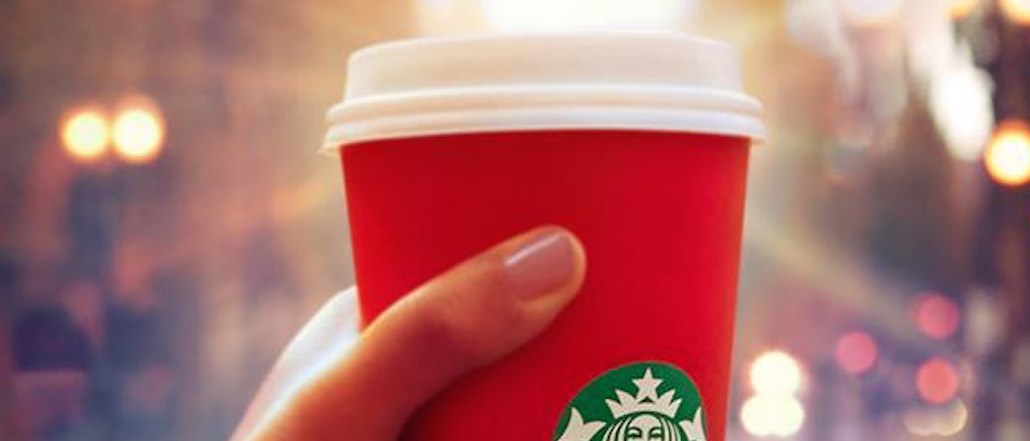Secure your place at the Digiday Publishing Summit in Vail, March 23-25

Hell hath no fury like a steamed Starbucks shopper.
Beginning in April, the coffee chain is changing its loyalty program, making it harder for small spenders to score freebies and brewing outrage among its legion of fans.
Right now, Starbucks rewards shoppers with a star for each purchase. After 30 purchases, they get to the coveted “gold” level, which includes frequent free drinks and extra coupons. That’s ending, with Starbucks rewarding two stars based on the each dollar spent, increasing the number of stars needed to hit gold status to 300 stars.
That doesn’t sound too bad until you do the math: Under the new plan, a customer has to spend more than $60 before hitting the gold level. That’s bad news for people who stick to $3 coffees since it’ll soon take much longer to achieve gold status, but good news to those who spend $5 or more since it’s now faster.
Here’s a before and after tweeted from a self-appointed “Starbucks Geek:”
MSR changes seem to be confirmed. New plan goes into effect in early April. pic.twitter.com/xoIFFKucwG
— Starbucks Geek (@SbuxGeek) February 19, 2016
For Starbucks, it’s a move to improve its bottom line, since it incentivizes people to spend more on their expensive sandwiches and tchotchkes. It also cuts down on the line because people won’t ask for separate transactions to beef up their star status.
Starbucks admitted in an investors call that it will be a disadvantage to a “small minority” of low-spending customers. Apparently that “small minority” are all on Twitter, loudly complaining at the chain:
Devaluation of @starbucks rewards program in April sucks. Presently get a free drink for approx every $48, soon must spend $62.50 #dothemath — Erik Miller (@erik_miller) February 22, 2016
Starbucks rewards program changes are bullshit IMO
— Lindsay Mills (@lindsaymills) February 22, 2016
What #Starbucks did with #StarbucksRewards today is nothing but pure greed. Plain & simple. Any other reason they give is pure bullshit. — ken woo (@doubleuohoh) February 23, 2016
Have been a #StarbucksRewards gold member since 2011. Not impressed w/new changes. Not wise to punish your breadnbutter. #coffeewithcream
— Sarah McNay (@SarahMcNay) February 23, 2016
Hey @starbucks – you look like this guy right now. You never wanna look like this guy. #StarbucksRewards pic.twitter.com/jAzsJ1Jvi6 — Katherine (@katherineabrown) February 23, 2016
On Starbucks’ Twitter account, the chain is comforting flustered people telling them it plans more “Double Star Days” and more ways to earn stars:
@NickAlanJones We’ll be introducing monthly Double-Star Days and new ways for you to earn more Stars, both in and out of our stores soon.
— Starbucks Coffee (@Starbucks) February 23, 2016
@TortillaMarissa We don’t want you to be bummed, Marissa! There will be lots of extra opportunities to earn s down the road. Stay tuned! — Starbucks Coffee (@Starbucks) February 23, 2016
Starbucks’ competitors have remained silent so far online, but Eight O’Clock Coffee is making it well aware that it’s cheaper to brew coffee at home:
Know what’s more rewarding than a coffee house rewards program? https://t.co/zfqNjz3W5w
— Eight O’Clock Coffee (@8OClockCoffee) February 22, 2016
Ya burnt. Update 2:40 p.m.: Looks like Dunkin’ Donuts has slyly responded:
You’re ALL ‘s to us. Enroll in DD Perks and get a FREE Beverage! https://t.co/6CGRvjO20Q pic.twitter.com/1CYloGA06h
— Dunkin’ Donuts (@DunkinDonuts) February 23, 2016
More in Marketing

Why Edward Jones’ agentic AI trial comes with limits
Edward Jones tests agentic AI to drive marketing productivity, taking a measured approach as it stops short of full automation.

Footwear brands navigate uncertainty after latest tariffs flip-flop
Some 99% of footwear sold in the U.S. today is imported, according to the Footwear Distributors and Retailers of America.

Brands at eTail Palm Springs share lessons on the ‘messy middle’ of building AI tools
Here’s a rundown of lessons brands have shared about their AI implementations so far.





